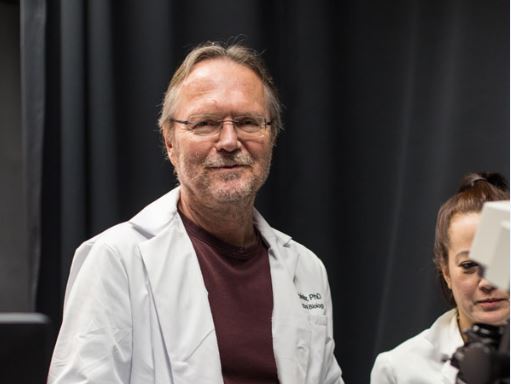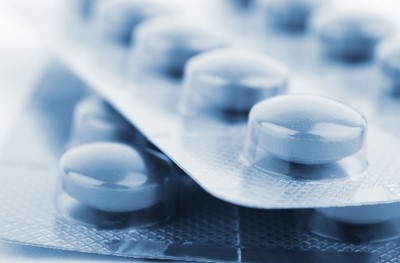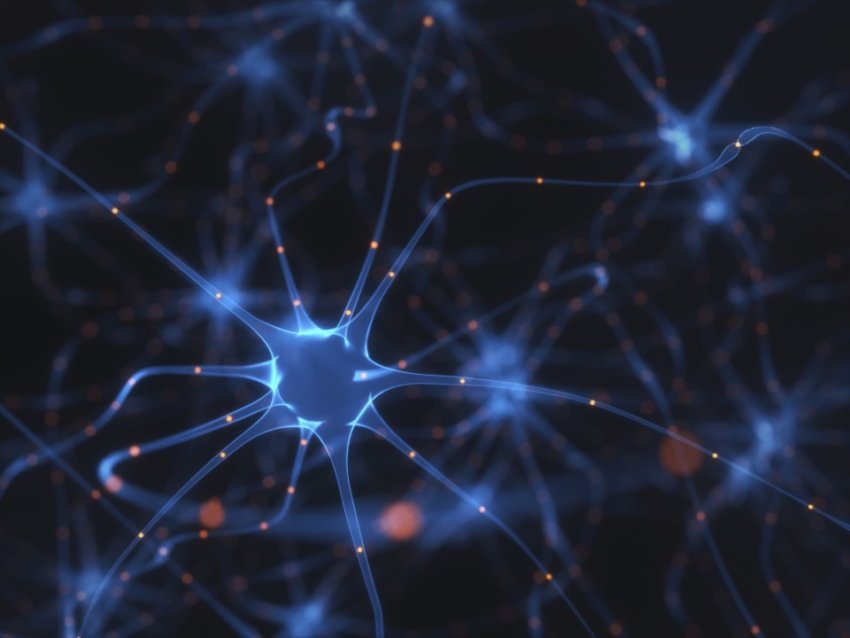UT Health Science Center San Antonio spinoff company gains funding for trial in people.
Contact: Will Sansom, (210) 567-2579, sansom@uthscsa.edu
SAN ANTONIO (Oct. 4, 2021) — Research that began at The University of Texas Health Science Center at San Antonio 15 years ago is nearing a significant milestone: human testing of an intravenous (IV) drug to treat brain injuries such as concussion and stroke.
The implications are enormous. A therapy for soldiers on the battlefield, car crash victims, concussed football players and people who suffer strokes could ease the pain and suffering of thousands worldwide daily and prevent debilitating long-term effects of traumatic brain injury.
Astrocyte Pharmaceuticals is a UT Health Science Center San Antonio spinoff company founded on technology owned by The University of Texas System Board of Regents. The company, located in Groton, Conn., attracted a $3 million award in September from the Medical Technology Enterprise Consortium (MTEC) to fund Phase 1 clinical safety studies of the IV-delivered drug in people.

“We’ve gone from having exciting results in mice to confirmational results in larger, more complex animals, and the drug shows impressive benefits every time,” said James D. Lechleiter, PhD, professor of cell systems and anatomy at UT Health Science Center San Antonio. “Beyond the great efficacy, there is also a very large safety window, so we can envision using the treatment broadly, including with mild concussions.”
The ideas for the therapy originated in the Lechleiter laboratory, and he is the inventor of record on the first U.S. patent awarded for it on Dec. 31, 2013. Astrocyte Pharmaceuticals has an exclusive worldwide license agreement with UT Health Science Center San Antonio on the invention, and the health science center maintains an equity interest in its commercialization.
The $3 million MTEC award ensures further progress at a crucial stage: first-in-human clinical trials. “We’re not just saying that the drug may someday be tested,” Dr. Lechleiter said. “This money actually funds these Phase 1 clinical studies starting next year.”
According to its website, MTEC is a 501(c)(3) biomedical technology consortium collaborating under an Other Transaction Agreement (OTA) with the U.S. Army Medical Research and Development Command. MTEC awards tens of millions every year from the U.S. Department of Defense with a focus on DoD priorities.
 Astrocyte Pharmaceuticals recently also garnered a $500,000 award from MTEC and the BrightFocus Foundation to accelerate development of an oral field formulation of the experimental medication.
Astrocyte Pharmaceuticals recently also garnered a $500,000 award from MTEC and the BrightFocus Foundation to accelerate development of an oral field formulation of the experimental medication.
“Right now most of our studies have used an IV injection, which is well suited for use in the ambulance or emergency room, where the IV administers the drug over 10 minutes, but these grant awards now accelerate the development of a small oral disintegrating tablet version,” said William Korinek, PhD, CEO of Astrocyte Pharmaceuticals.
“Imagine that soldier, that athlete, who unfortunately gets concussed,” Dr. Lechleiter said. “Our vision is that they’ll be able to take this oral penny-sized tablet that would limit the damage and brain swelling after injury and accelerate recovery.”
Relief for the brain: Genesis of the idea
Many of the brain injury drug candidates previously advanced by other groups have focused on the nerve cell. “But the most common cell in the brain is actually the astrocyte, and it is plentiful and important for a reason,” Dr. Lechleiter said. “Its role in the brain includes limiting stress and damage. Until recent years, the astrocyte wasn’t fully appreciated as a therapeutic target,” Dr. Lechleiter said.
His research aimed at boosting astrocyte activity during brain injury and evaluating whether this had a protective effect. The verdict from the mouse studies: it worked.
Hard work and perseverance led to a U.S. patent at the end of 2013.
Dr. Lechleiter seized the opportunity to file for a U.S. patent. Defending the patent claim took six years, from 2007 to 2013. Finally, the patent was awarded. The Office of Technology Commercialization at UT Health Science Center San Antonio worked throughout those years with Dr. Lechleiter on the patent effort.
“That patent was the basis of the company; it gave us the foundation and protection to build,” Dr. Korinek said. “Since then, the research has led us to four additional patents that further affirm the breadth of the opportunity.”
Capital from the UT Horizon Fund of The University of Texas System was instrumental in getting the company off the ground and enabling it to manufacture more of the drug and advance into larger studies. Astrocyte Pharmaceuticals attracted other strategic and angel investors during a financing seed round in 2017 and a Series A round in 2020, and now has garnered about $20 million in private and public financing since its inception.
Pilot studies supported by the President’s Translational and Entrepreneurial Research Fund (PTEF) at UT Health Science Center San Antonio showed the drug also had potential to be used in neurodegenerative diseases, which proved to be crucial in garnering the new $500,000 MTEC/BrightFocus award.
“We are very proud of Dr. Lechleiter and his team and have endorsed his excellent work over the years,” said Byron Hepburn, MD, FAAFP, director of the Military Health Institute (MHI) at UT Health Science Center San Antonio. “We understand its significance and promise for our military and civilian brain injury patients. Our MHI is also honored to sponsor our university’s membership in the MTEC, which serves to advance U.S. Department of Defense research and product development such as Dr. Lechleiter’s.”
Ready to start treating patients
The experimental medication has been tested in multiple laboratories across the world. A subcontractor in Japan performed non-human primate studies of the drug’s safety and efficacy in Old World monkeys called macaques. Other collaborations have taken place in Germany, Australia, Italy and China.
 “This therapy is no longer just an idea,” Dr. Korinek said. “There’s been a substantial amount of research to understand how this drug works, its safety profile, its distribution and metabolism, and where it can have the most benefit. We are now ready to start treating people and understand if the benefits and safety we saw in animals translates to humans. It’s a big milestone.”
“This therapy is no longer just an idea,” Dr. Korinek said. “There’s been a substantial amount of research to understand how this drug works, its safety profile, its distribution and metabolism, and where it can have the most benefit. We are now ready to start treating people and understand if the benefits and safety we saw in animals translates to humans. It’s a big milestone.”
Based on animal studies, the company is able to project the likely dose of the drug for humans. These first human clinical trials will assess if there are any differences in how humans metabolize the drug that would lead to different dosing regimens. The trials will also confirm the safety profile of the agent. The lack of toxicities in animals suggests that the dosage could potentially even be increased if needed, without side effects.
What is the market for a drug like this? There is no clear benchmark. “There aren’t really great drugs out there right now for treating either stroke or traumatic brain injury,” Dr. Korinek said. “The best example is tissue plasminogen activator (tPA) in stroke that generates more than a billion dollars each year, but tPA is only used in about 5% of stroke patients. Our drug could be used in almost all stroke patients, and then also in traumatic brain injury and concussion patients.”
Science will win the day, it has been said. Dr. Lechleiter’s idea, confirmed in the laboratory at UT Health Science Center San Antonio, has been validated multiple times in animal models and is now progressing — soon — to people. If safety and efficacy are confirmed, the winner will not just be science, but the people of the world.
The University of Texas Health Science Center at San Antonio, also referred to as UT Health San Antonio, is one of the country’s leading health sciences universities and is designated as a Hispanic-Serving Institution by the U.S. Department of Education. With missions of teaching, research, patient care and community engagement, its schools of medicine, nursing, dentistry, health professions and graduate biomedical sciences have graduated 39,700 alumni who are leading change, advancing their fields, and renewing hope for patients and their families throughout South Texas and the world. To learn about the many ways “We make lives better®,” visit www.uthscsa.edu.
Stay connected with UT Health San Antonio on Facebook, Twitter, LinkedIn, Instagram and YouTube.
To see how we are battling COVID-19, read inspiring stories on Impact.


